SWEDISH SOUTH ASIAN STUDIES NETWORK
• Workshop Report• Useful background |
SASNET workshop 2006 on
The role
of South Asia
in
the internationalisation
of
higher education in
Sweden
The workshop was jointly organised by SASNET, Karolinska Institutet Medical University and the Swedish Institute
Time: Tuesday 28 and Wednesday 29 November 2006
Location: Nobel Forum, Karolinska institutet, Nobels väg 1, Stockholm/Solna
Aim of the seminar: To discuss the context, conditions and suitable directions for an increased interaction with South Asia in higher education. What forms should it take? How can it be financed?
Organisational Committee:
•
Staffan Lindberg, Lars Eklund
and Boel Billgren, SASNET;
•
Bo Lindblad, Karolinska institutet Medical University
•
Ulla Rylander,
Swedish Institute
Background: South
Asia has one fourth of the world population and more than half
of the poorest 1/5. It has all the major development problems of
the contemporary world, including the most serious environmental
problems (water, soil, vegetation and air) and health challenges.
At the same time South Asia, especially India is now fast emerging as
one of the major economical and intellectual centres of the globe. Its
magnitude will soon be felt worldwide not just in the IT sphere but also
in the field of production of services and goods in the international
markets and in intellectual, scientific and cultural spheres. The creativity
stems from the meeting of people from the many different cultures and
castes in new flat institutions and business organisations and the return
of white-collar migrants who worked in the West.
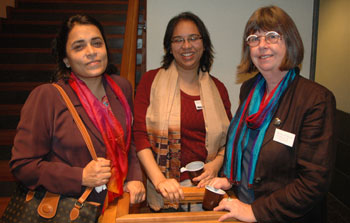 |
| Rubhana Raqib from icddr,b in Dhaka, with Zarina Kabir and Gunilla Mellin from Karolinska Institutet. |
Sweden
has a long history of interaction with South Asia in cultural, economic
and educational fields but its presence is still rather limited compared
to parts of East Asia and Africa. There is also a long experience of
development cooperation but much less of public resources are today earmarked
for academic and other exchange with South Asia.
At present there
is a growing interest on part of Swedish industry to increase its
presence in South Asia and collaboration with Indian/South Asian
companies. We can also foresee a steady increase of interest to
interact in all other spheres, not least in research and education.Thus,
there is both a strong development motive and a strong self-interest
motive to increase Swedish interaction with South Asia. When it comes
to student exchange, the number of South Asian students coming to Swedish
universities have increased dramatically in the last few years. One reason
is the changed relation to USA on part of Muslims in South Asia after
11 September 2001.
Another reason is
the focussed recruitment of South Asian students to Swedish University
Colleges when they could not fill their courses with Swedish and
European students. But is this really a healthy solution to financial
problems at Swedish universities? And, more importantly, what should
be the aim of such recruitment?
Programme
Please note that after the workshop, several presentations are now available as pdf-files.
Tuesday 28 November
9.30 – 11.30.
Introductory Session
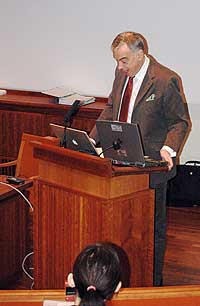 • Welcome by Professor Harriet Wallberg-Henriksson,
President of Karolinska Institutet
• Welcome by Professor Harriet Wallberg-Henriksson,
President of Karolinska Institutet
• Address by Mr. Lars Leijonborg, Minister of Education, Government
of Sweden (photo to the right)
• Prof. Staffan Lindberg, Director of SASNET
• Associate Professor Elias Arnér, Dean of Post graduate
education, Karolinska Institutet. Read Dr. Arnér’s
presentation at the workshop (as
a pdf-file)
• Mr. Niklas Tranaeus, Swedish Institute, on the importance of student
exchange. Read Mr. Tranaeus’ presentation
at the workshop (as a pdf-file)
• Dr.
Rubhana Raqib, Scientist, Immunology Unit,
Laboratory
Sciences Division, ICDDR,B: Centre for
Health and Population Research, Dhaka, Bangladesh.
Read Dr. Raqib’s presentation at the workshop (as
a pdf-file)
• Mr. Sunandan Roy Chowdhury, Editor-Publisher, Sampark
Journal of Global Understanding, Kolkata, India. Read
Mr. Chowdhury’s presentation at the workshop (as a pdf-file)
• Questions,
discussion
11.30 – 13 & 14 – 15.30.
Session 1.
Recruitment of South Asian students in hard sciences in Sweden,
Chairperson: Prof. Bo Lindblad, IHCAR, Karolinska Institutet
• The Karolinska
Institutet experience, PhD sandwich programme with Pakistan. Associate
Professor Cecilia Stålsby Lundborg and PhD
Candidate Mohsin Saeed Khan, Division of International Health
(IHCAR), Department of Public Health Sciences, KI. Read
Dr. Stålsby Lundborg’s presentation at the workshop (as
a pdf-file)
• The
Uppsala University experiences in International Maternal and Child Health
(IMCH), Prof. Lars-Åke Persson, and Dr. Rubhana Raqib, ICDDR,B,
Dhaka (photo to the left). Read Prof.
Persson’s
presentation at the workshop (as a
pdf-file)
• Chalmers experience with students from Bangladesh, Raihan Rafique,
representative for the Association of Bangladeshi Students in Sweden. Read
Mr. Rafique’s presentation at the workshop (as a pdf-file)
• Chalmers
experience with students from India, Associate Professor Devdatt Dubhashi,
Department of Computing Science. Read Dr. Dubhashi’s
presentation at the workshop (as a pdf-file)
• Biotechnology, Lund University,
Prof. Olle Holst. Read Prof. Holst’s
presentation at the workshop (as a pdf-file)
• Swedish Institute supported exchanges with South Asia and cooperation
with Higher Education Commission of Pakistan, Ulla Rylander. Read
Ulla Rylander’s presentation at the workshop (as a pdf-file)
• Blekinge Institute of Technology, experiences of recruiting masters
students from South Asia, Dr. Jan-Olof Gustavsson, http://www.bth.se/eng/
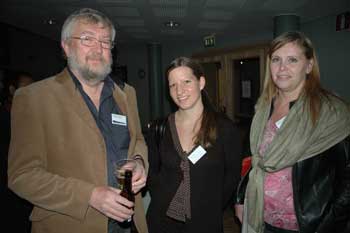 |
| Kjell-Ove Holmström, Skövde University, Jessica Voggenberger, Embassy of India, and Ingibjorg Stefansdottir, Lund University |
• Skövde – Linköping
collaboration with India, Associate Professor Kjell Ove Holmström,
School of Life Sciences, Skövde University. http://www.sasnet.lu.se/healthskovde.html
• International
Science Programme, Uppsala University, Associate Professor Peter Sundin. Read
Dr. Sundin’s presentation at the workshop (as a pdf-file)
16.00 – 18.
Session 2. South Asian students in soft sciences
in Sweden
Chairperson: Per Hilding, Director of Studies for International Relations,
Department of Economic History, Stockholm University
• Lund University Masters Programme in South
Asian Studies. Dr. Jan Magnusson, School of Social Work. Read
Dr. Magnusson’s presentation at the workshop (as a pdf-file)
• Uppsala University’s multidisciplinary education
in a South Asia Studies master's programme (2002-04), and exchange
collaboration programme with University of Calcutta (from 2004),
Associate Professor Gunnel Cederlöf,
Department of History. http://www.sasnet.lu.se/antroupp.html#kolkata
• Göteborg School of Global Studies: PhD
students from Sri Lanka, Associate Professor Mikael Schultz and
PhD Candidate Dhammika Herath. Read Dr.
Schultz’ presentation at the workshop (as a pdf-file)
• SPIDER, Swedish Program for ICT in Developing Regions, split
PhD programme for Srilankan doctoral students 1999–2004.
Mr. Rodolfo Candia, Department of Computer and Systems Sciences
(DSV), Stockholm University and Royal Institute of Technology (KTH)
in Kista. Read Mr. Candia’s
presentation at the workshop (as a pdf-file)
• Borås University College,
Michael Tittus, Head of the School of Engineering. Read
Michael Tittus’ presentation at the workshop (as
a pdf-file)
• Uppsala
University, collaboration with Hyderabad, India. Associate professor
Hans Blomkvist, Department of Government. http://www.sasnet.lu.se/polsciupp.html#hyderabad
• Kalmar University College, Prof. William Hogland, Department of
Technology. Read Prof. Hogland’s presentation
at the workshop (as a pdf-file)
Wednesday 29 November
9.00 – 13.00
Session 3. Sending students to South
Asia.
Chairperson: Associate Professor Gunnel Cederlöf, Department of
History, Uppsala University
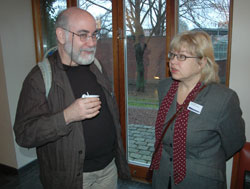 |
| Marc Katz, Karlstad University and Mirja Juntunen, Uppsala University. |
•
Nordic Centre in India, summer and semester courses in Hyderabad. Dr.
Mirja Juntunen. http://www.nci.uu.se/study_in_india.php
• Peace and conflict studies in Pondicherry, India – a
Norwegian Programme, Rune Tjelland, Styreformann i Kulturstudier,
Oslo. http://kulturstudier.com/
• Karlstad University Teachers training and other educational
activities in Banaras and Dharamsala, Associate Professor Marc Katz,
Department of Religious Studies and Theology. http://www.sam.kau.se/religion/indien/eng/
• Örebro University’s
India Programme, Dr. Anders Jonsson, Department of Sociology, and Assistant
Professor Pell Uno Larsson, Department of Clinical Medicine. http://www.swedenindia.org/
Read Dr. Anders Jonsson’s presentation
at the workshop (as a pdf-file)
• Lund
Masters Programme in South Asian Studies, Dr. Jan Magnusson. Read
Dr. Magnusson’s presentation at the workshop (as a pdf-file)
• Student’s experiences from NCI course in Hyderabad and
Lund Masters programme fieldwork in India. Ingibjorg Stefansdottir. Read
Ingibjorg Stefansdottir’s presentation at the workshop (as
a pdf-file)
• KTH:
building a new Technical university in Pakistan, Dr. Ramon Wyss, Department
of Nuclear Physics, Vice President of International Affairs at KTH.
http://www.sweden.se/templates/cs/News____13415.aspx
• KTH:
strong interaction with Indian universities, Prof. K.V.Rao, Division
of Engineering Material Physics. Read Prof.
Rao’s
presentation at the workshop (as a pdf-file)
• Swedish technology students
studying at IIT Mumbai, Markus Kirsten. Read
Markus Kirsten’s presentation at the workshop (as a pdf-file)
14.00 – 16.30
Session 4. Best strategies
for marketing Higher Swedish Education in South Asia, and for sending
students to Higher Education in South Asia?
– Panel
discussion
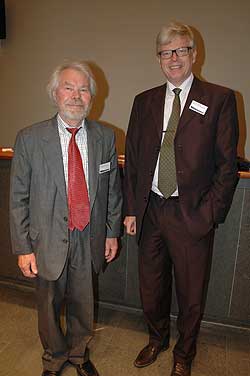 |
| Staffan Lindberg, SASNET, with Erland Ringborg, Ministry of Foreign Affairs. |
Chairperson: Prof. Staffan Lindberg, Department of Sociology, Lund University & Director, SASNET
Key persons:
• Beppe Karlsson, Nordic Centre in India. http://www.nci.uu.se/
• Marc Katz, Department of Religious Studies and Theology, Karlstad
University
• Cecilia Stålsby Lundborg, IHCAR, Karolinska Institutet
• K.V.S.
Prasad, Department of Computer Science and Engineering, Chalmers University
of Technology. http://www.cs.chalmers.se/~prasad
• Erland Ringborg, Ministry of Foreign Affairs. Former
Head of the Swedish Institute. Wrote an official report on the issue
of university fees for foreign students, presented in January 2006. http://www.regeringen.se/sb/d/6293/a/57100
• Niklas Traneus, Swedish Institute. Read
Mr. Tranaeus’ presentation (as a pdf-file)
Workshop participants:
Stockholm-Uppsala area:
International Programme Office for Education and Training
• Eva
Ehdwall
Karolinska Institutet Medical University
• Harriet
Wallberg Henriksson
• Elias Arnér
• Bo
Lindblad
• Cecilia Stålsby Lundborg
• Vinod Diwan
• Anna
Persson
• Göran Tomson
• Zarina
Kabir
• Sanjeevi Carani
• Helen
Conte
• Björn Klinge
• Gunilla
Norhagen
• Gunilla Mellin
• Mohsin
Saeed Khan
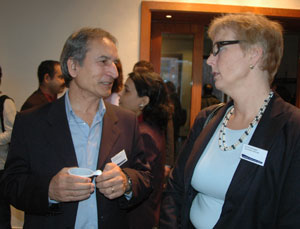 |
| Vinod Diwan and Gunilla Norhagen, Karolinska Institutet. |
Royal Institute of Technology, KTH
• Ramon Wyss
• K.V.
Rao
• Mannan Mridha
• Rodolfo Candia
• Markus Kirsten
Ministry of
Education
• Lars Leijonborg
Ministry of Foreign Affairs
• Erland Ringborg
• Johanna
Sommansson
South Asian embassies in Stockholm
• Muhammad
Aamar Aftab, First Secretary, Embassy of Pakistan
• Mr.
Premadasa, Embassy of Sri Lanka
• Jessica Voggenberger,
Embassy of India
• Shahnaz Gazi, Embassy of Bangladesh
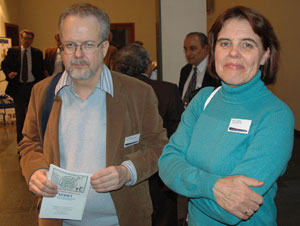 |
| Per Hilding, Stockholm University and Anna Lindberg, Lund University. |
STINT
• Katarina Wiberg
Stockholm University
• Per
Hilding
• Åke Nagrelius
• Christer
Norström
• Henrik Berglund
Swedish Institute
• Ulla Rylander
• Niklas Tranaeus
• Kurt
Bratteby
Swedish National Agency for Higher Education
• Cecilia
George
Swedish University for Agricultural Sciences
(SLU), Uppsala
• Wijnand Boonstra
• Sadhna
Alström
• Seema Arora-Jonsson
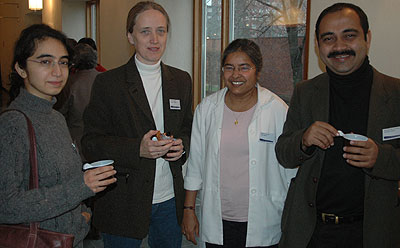 |
| Seema Arora Jonsson, Swedish University of Agricultural Sciences (SLU), Uppsala, Gunnel Cederlöf, Uppsala University, Sadhna Alström, SLU, and Sunandan Roy Chowdhury, Samparkworld, Kolkata, India. |
Södertörn University College
• Per
Ståhlberg
Uppsala University
• Gunnel
Cederlöf
• Lars-Åke Persson
• Anju Saxena
• Beppe
Karlsson
• Mirja Juntunen
• Hans
Blomkvist
• Peter Sundin
”Mofussil
areas”
(‘Mofussil areas’ is Anglo-Indian terminology
for rural localities as opposed to chief station)
Blekinge Institute
of Technology, Karlskrona
• Jan-Olof Gustavsson
Borås University College
• Michael Tittus
Chalmers University of Technology
• Devdatt Dubhashi
• K.V.S.
Prasad
• Raihan Rafique
• Md.
Mafijul Islam
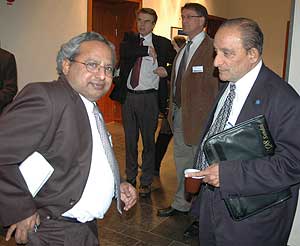 |
| Hanumantha Rao, Luleå University of Technology, Per Hagander, Lund University, Olle Holst, Lund University, and K.V. Rao, KTH. |
Göteborg University
• Mikael
Schultz
• Dhammika Herath
• Kerstin
Andersson
Kalmar University College
• William
Hogland
Karlstad University
• Marc Katz
Luleå University of Technology
• Hanumantha
Rao
Lund University
• Anna Lindberg
• Olle
Holst
• Boel Billgren
• Jan
Magnusson
• Lars Eklund
• Per
Hagander
• Staffan Lindberg
• Baboo
Nair
• Ingibjorg Stefansdottir
• Torkel
Wadström
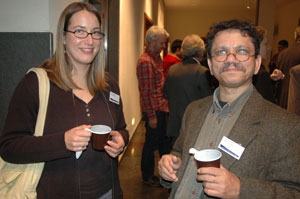 |
| Cecilia George, Swedish National Agency for Higher Education, and Anver Siddiqui, Växjö University. |
Skövde University
• Kjell
Ove Holmström
Umeå University
• Md.
Showkat Gani
Växjö University
• Om
Prakash
• Anver Siddiqui
Örebro
University
• Pell-Uno Larsson
• Anders
Jonsson
Participants from abroad
• Rune
T Jelland, Kulturstudier, Oslo, Norway
• Rubhana Raqib, icddrb, Dhaka, Bangladesh
• Sunandan
Roy Chowdhury, Sampark, Kolkata, India
SASNET - Swedish South Asian Studies
Network/Lund University
Address: Scheelevägen 15 D, SE-223 70 Lund, Sweden
Phone: +46 46 222 73 40
Webmaster: Lars Eklund
Last updated
2009-09-25
